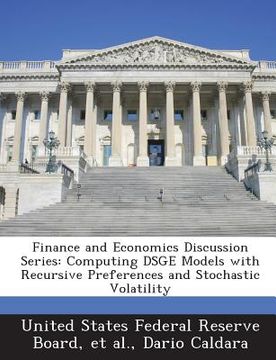Share
Finance and Economics Discussion Series: Computing Dsge Models with Recursive Preferences and Stochastic Volatility (in English)
United States Federal Reserve Board
(Author)
·
Dario Caldara
(Author)
·
Bibliogov
· Paperback
Finance and Economics Discussion Series: Computing Dsge Models with Recursive Preferences and Stochastic Volatility (in English) - United States Federal Reserve Board ; Et Al ; Caldara, Dario
$ 13.26
$ 15.75
You save: $ 2.49
Choose the list to add your product or create one New List
✓ Product added successfully to the Wishlist.
Go to My WishlistsIt will be shipped from our warehouse between
Monday, July 15 and
Tuesday, July 16.
You will receive it anywhere in United States between 1 and 3 business days after shipment.
Synopsis "Finance and Economics Discussion Series: Computing Dsge Models with Recursive Preferences and Stochastic Volatility (in English)"
This paper compares different solution methods for computing the equilibrium of dynamic stochastic general equilibrium (DSGE) models with recursive preferences such as those in Epstein and Zin (1989 and 1991) and stochastic volatility. Models with these two features have recently become popular, but we know little about the best ways to implement them numerically. To fill this gap, we solve the stochastic neoclassical growth model with recursive preferences and stochastic volatility using four different approaches: second- and third-order perturbation, Chebyshev polynomials, and value function iteration. We document the performance of the methods in terms of computing time, implementation complexity, and accuracy. Our main finding is that perturbations are competitive in terms of accuracy with Chebyshev polynomials and value function iteration while being several orders of magnitude faster to run. Therefore, we conclude that perturbation methods are an attractive approach for computing this class of problems.
- 0% (0)
- 0% (0)
- 0% (0)
- 0% (0)
- 0% (0)
All books in our catalog are Original.
The book is written in English.
The binding of this edition is Paperback.
✓ Producto agregado correctamente al carro, Ir a Pagar.

